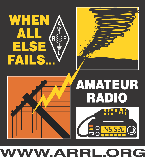| Main Menu |
| Home |
| Forms |
| From the EC |
| Leadership |
| Operations |
| Planning |
| Safety |
| Contact Us |
| WAARC |
| CERT |
| Iowa Winlink Weekend |
| Southeast Iowa Hamfest |



| Main Menu |
| Home |
| Forms |
| From the EC |
| Leadership |
| Operations |
| Planning |
| Safety |
| Contact Us |
| WAARC |
| CERT |
| Iowa Winlink Weekend |
| Southeast Iowa Hamfest |

![]() ARRL ARES® Plan
ARRL ARES® Plan
ARRL Courses:
 Tornado Awareness (AWR-326)
Tornado Awareness (AWR-326)
Winter Weather Hazards (AWR-331)
Flooding Hazards (AWR-362)
Community Disaster Communications (AWR-329)
 FEMA Courses:
FEMA Courses:
The Department of Homeland Security (DHS) now requires all volunteers, including amateur radio operators, to have completed the Federal Emergency Management Agency (FEMA) IS-100, IS-200, IS-700 and IS-800 course material. These courses are available as on-line independent-study courses that are free of charge at the links above.
All amateur radio operators participating in emergencies must have completed the FEMA training courses. A secondary reason for requiring these courses is that grant money from various government organizations requires certification of all emergency participants, including volunteers.
All members must have a common understanding of the ICS. The baseline courses are defined above.
We also recommend the ARRL EC-001 course so that everyone has the fundamental knowledge of how amateur radio operates as part of emergency communications.
ARRL Iowa Section ARES® Code of Conduct
In order to be a member of ARES® you shall have a valid Amateur Radio license issued by the Federal Communications Commission, must complete the 4 basic on-line courses and should complete 1 more on-line course – that’s it!
To register with ARES®, complete
ARRL Form FSD-98
and send, or give it to your local EC - Emergency Coordinator or AEC - Assistant Emergency Coordinator.
In Washington County, Iowa, the EC is Mark Lukins, ABØDX
Most hams interested in ARES® have a basic understanding of FM voice communication, as a result of the popularity of 2 Meters and the low price of radios for that band and mode. With the practice that comes from net check-ins, public service events and our exercises, this skill level will allow you to contribute during emergencies.
ARES® members are expected to own a computer with an Internet connection and have some knowledge of its operation. Email is our primary tool for newsletters and day-to-day communications.
More FEMA Courses for ARES®®
